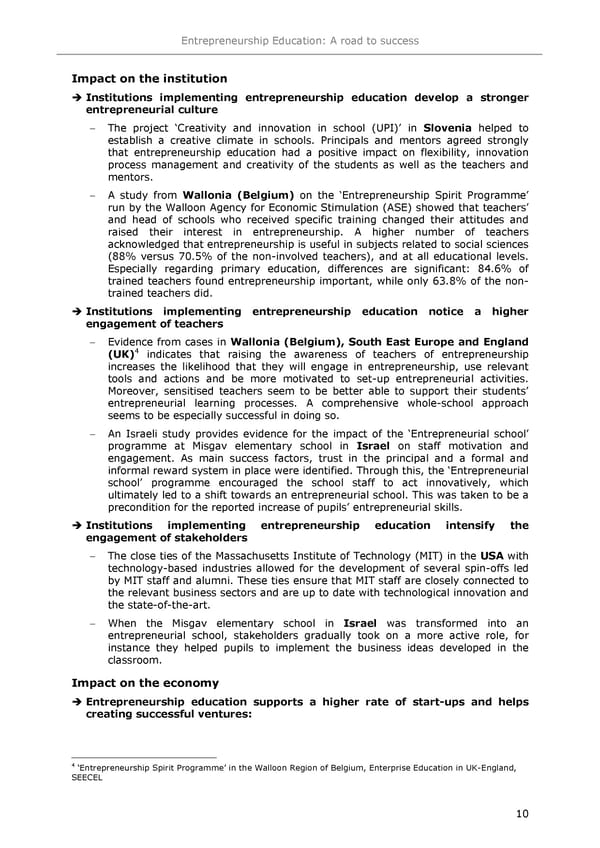Entrepreneurship Education: A road to success Impact on the institution Institutions implementing entrepreneurship education develop a stronger entrepreneurial culture The project 8Creativity and innovation in school (UPI)9 in Slovenia helped to establish a creative climate in schools. Principals and mentors agreed strongly that entrepreneurship education had a positive impact on flexibility, innovation process management and creativity of the students as well as the teachers and mentors. A study from Wallonia (Belgium) on the 8Entrepreneurship Spirit Programme9 run by the Walloon Agency for Economic Stimulation (ASE) showed that teachers9 and head of schools who received specific training changed their attitudes and raised their interest in entrepreneurship. A higher number of teachers acknowledged that entrepreneurship is useful in subjects related to social sciences (88% versus 70.5% of the non-involved teachers), and at all educational levels. Especially regarding primary education, differences are significant: 84.6% of trained teachers found entrepreneurship important, while only 63.8% of the non- trained teachers did. Institutions implementing entrepreneurship education notice a higher engagement of teachers Evidence from cases in Wallonia (Belgium), South East Europe and England 4 (UK) indicates that raising the awareness of teachers of entrepreneurship increases the likelihood that they will engage in entrepreneurship, use relevant tools and actions and be more motivated to set-up entrepreneurial activities. Moreover, sensitised teachers seem to be better able to support their students9 entrepreneurial learning processes. A comprehensive whole-school approach seems to be especially successful in doing so. An Israeli study provides evidence for the impact of the 8Entrepreneurial school9 programme at Misgav elementary school in Israel on staff motivation and engagement. As main success factors, trust in the principal and a formal and informal reward system in place were identified. Through this, the 8Entrepreneurial school9 programme encouraged the school staff to act innovatively, which ultimately led to a shift towards an entrepreneurial school. This was taken to be a precondition for the reported increase of pupils9 entrepreneurial skills. Institutions implementing entrepreneurship education intensify the engagement of stakeholders The close ties of the Massachusetts Institute of Technology (MIT) in the USA with technology-based industries allowed for the development of several spin-offs led by MIT staff and alumni. These ties ensure that MIT staff are closely connected to the relevant business sectors and are up to date with technological innovation and the state-of-the-art. When the Misgav elementary school in Israel was transformed into an entrepreneurial school, stakeholders gradually took on a more active role, for instance they helped pupils to implement the business ideas developed in the classroom. Impact on the economy Entrepreneurship education supports a higher rate of start-ups and helps creating successful ventures: 4 8Entrepreneurship Spirit Programme9 in the Walloon Region of Belgium, Enterprise Education in UK-England, SEECEL 10
 Entrepreneurship Education Page 13 Page 15
Entrepreneurship Education Page 13 Page 15